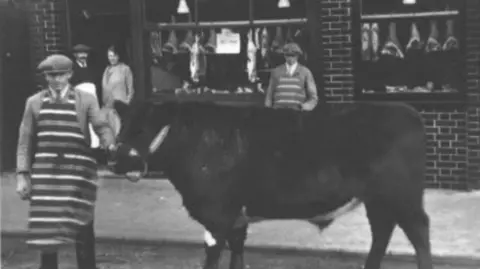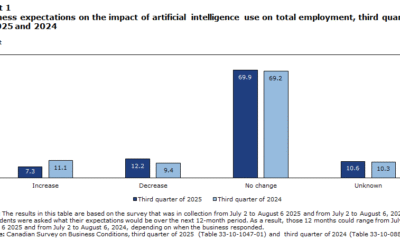Business
How Business Executives Can Use AI To Market Their Nonfiction Books

Writing nonfiction books can be an effective way for company executives to become thought leaders and build their personal brands. Thanks to AI, marketing those books is now easier than ever before.
getty
Writing nonfiction books can be an effective way for company executives to become thought leaders and build their personal brands. Thanks to AI, marketing those books is now easier than ever before. With the publication today of my fifth book, “The Crisis Casebook: Lessons in Crisis Management from the World’s Leading Brands,” I thought it was a good time to see how business leaders and others can use AI to promote their books.
Given the number of books that are published every year—more that two million, according to the United Nations Educational, Scientific and Cultural Organization—it’s a challenge for authors to get their books noticed. That river of new books is becoming a flood, because AI enables authors to research, write, edit, and publish their books faster and easier. About 45% of recently surveyed authors use some form of generative AI to assist with their work, according to Bookbub.
Book Publishing Reality Checks
There can be challenges and issues in using generative AI to write books. Some publishers may restrict or prohibit authors from using the rapidly evolving technology, or place conditions on its use.
For example, Amazon says on its website that it requires authors to disclose the use “of AI-generated content (text, images, or translations) when you publish a new book or make edits to and republish an existing book through KDP. AI-generated images include cover and interior images and artwork.” The author is still responsible for verifying that all AI-generated and/or AI-assisted content adheres to all content guidelines, which, the Amazon policy clarifies, includes “complying with all applicable intellectual property rights.”
Whether or not AI is used while writing the book, both authors who self-publish their books and authors who are published by major commercial publishers are usually on their own when it comes to marketing the books. Very few authors with traditional publishers receive support with marketing. As such, the best time to begin marketing efforts, depending on when a book will be launched, is usually several months before the book is published. The longer lead time is necessary in order to help build interest in the book, encourage sales and preorders, and create buzz among likely readers. This can place additional burdens and pressures on writers who think their work is done when they finish their manuscripts. To the contrary, the author’s journey continues long after writing and editing.
AI-Generated Book Marketing Strategies
I wanted to see how AI’s book marketing guidance measured up against my own experiences and best practices for promoting books. So I began by asking ChatGPT what the best ways are to market my new crisis management book. It listed several suggested strategies, including developing an online presence, marketing the content on various social media platforms, leveraging email marketing, participating in events and workshops, investing in advertising, distributing a news release, and collecting reviews and testimonials.
That lined up well with my experience, except for its recommendation to advertise, which has not been effective for me in generating book sales in the past. Advertising is an expensive way to reach target audiences. Depending on the resources the new authors have, an advertising campaign could also be beyond their budgets. Generating publicity about my books, by comparison, has achieved better results and helped to reinforce my brand as a crisis management expert. In short, ChatGPT’s advice was generic and didn’t add anything beyond what I already knew. I had to dig deeper.
Target Audiences And Tactics
For a second opinion, I asked Canva Pro to design a book marketing campaign. It provided detailed guidance better tailored for my latest writing project. Among other things, it identified five target audiences, suggested four key marketing messages, provided timeframes for rolling out the campaign, and listed four hashtags.
Much of this advice was in sync with how I’ve marketed my past books. But a recommendation to distribute advance copies to reviewers and the media four weeks prior to publication missed the mark. Depending on when books are published, it’s a best practice to send those copies at least three months ahead of time in order to secure testimonials, reviews, and early press coverage. So far the AI tools were helpful compared to nothing at all, but fell short of what human experts would recommend.
Another AI-generated suggestion that people should pre-order the books several weeks out also did not ring true. When books are listed on Amazon, for example, pre-orders can begin at least four months earlier, based on my own experience. Canva Pro failed to recommend that I include the book on Goodreads.com and NetGalley.com, two popular websites where readers rate and post book reviews, which in turn can help drive interest and sales. All of this suggested the value of working with an experienced author or publisher, for advice, if the new author can afford it.
So I reached out to other authors for examples of how they’ve used AI to assist in implementing their book marketing tactics. When entrepreneur Randy Charach published his business strategy book “Client Centric,” he told me that he turned to AI to help market the book more efficiently.
“I used ChatGPT to draft personalized outreach emails, SurferSEO to guide blog posts that tied into the book’s themes, and Jasper.ai, along with AdCreative.ai, to test different ad copy on LinkedIn and Facebook,” Charach told me via email. “For social media, Ocoya made it easy to create variations of posts, so the promotion didn’t feel repetitive. These tools saved me time, but I always added my own stories and personality so the book’s message came through authentically.”
Comedian Zarna Garg performs on The Tonight Show Starring Jimmy Fallon on Friday, January 12, 2024 — (Photo by: Todd Owyoung/NBC via Getty Images)
Todd Owyoung/NBC via Getty Images
How To Use AI To Become A Best-Selling Author
Zarna Garg, a stay-at- home mom turned standup comedian, wrote a book, “This American Woman: A One-in-a Billion Memoir,” about her experience growing up in India and life in the United States. She asked her daughter Zoya, who was then a senior at Stanford University, to be in charge of a six-month marketing campaign that led up to the publication of the book last April. The ambitious goal was to generate 10,000 advance orders and get the book on the New York Times’ best sellers list.
She used different AI-powered tools to design and help implement various aspects of the marketing campaign. The tools included ChatGPT (to organize the campaign and identify marketing leads), Claude (for data tracking and analysis), ManyChat (to create direct messaging links) and Grok (to make diagrams that would help motivate members of her marketing team). But it did not end there.
“I used ChatGPT Voice to practice my sales proposal to small businesses who might be interested in placing a bulk order of 100 books,” Zoya Garg told me in an email interview. “I’d speak into the model and ask: ‘Is it clear what value the business will receive in exchange for money? Is there anything else I can offer that might make this deal compelling?’ I did not use ChatGPT during sales call[s]. I spoke freely with [the] hope that my practice rounds would make our value proposition clear. But practicing with an AI model saved time and energy of family members or friends I would’ve forced to listen to me until I made sense.”
AI helped reduce some of the burdensome work and the marketing campaign paid off, reaching 14,000 preorders and landing the book on the New York Times best sellers list. Zarna Garg credits her daughter for making the marketing of her memoir “efficient and impactful so I didn’t have to run from pillar to post doing traditional book tours,” she said in a statement, adding that Zoya uses “every AI tool available (and creates new ones if needed with her brother) to assist in sales, marketing, organizing and more—basically everything except the creative— which I handcraft the old fashioned way. The Garg family is not intimidated by AI, we are empowered by it.”
There are several best practices business authors should keep in mind to get the most out of AI marketing tools.
getty
7 AI Best Practices
There are several best practices authors should keep in mind to get the most out of AI book marketing tools.
- Know what you want to achieve with the technology.
- Ask AI to prepare optimal strategies for achieving your goals.
- Be as specific as possible when asking AI for help or guidance, and include how and when the book will be published.
- Ask AI to recommend deadlines and priorities for completing its suggested marketing tactics in time for the publication of the book.
- When using generative AI, edit the marketing and press materials it creates to ensure accuracy and that they reflect your voice and style. Check with publishers about any conditions or restrictions they place on the use of the technology.
- Refine your queries as necessary to ensure the recommendations are appropriate for your book project.
- Don’t wait until the book is published to begin working with AI. Experiment with different models and platforms to see which ones are the best fit for your purposes; ask for second opinions.
Business executives who cannot afford or do not want to hire others to market their books can use AI as an affordable safety net for recommendations about effective strategies, tactics, and techniques, and to assist in running their marketing campaigns. Having access to some advice is better than having no advice at all—as long as authors know the quality of the advice that they are receiving.
Business
UK economy saw zero growth in July

The UK economy failed to grow in July, according to the latest official figures.
The Office for National Statistics (ONS) said the economy saw zero growth in the month, following a 0.4% expansion in June.
However, monthly figures are volatile, and over the three months to the end of July, the economy grew by 0.2% compared with the previous three months, the ONS said.
The government is under mounting pressure to deliver on its key priority of boosting economic growth ahead of the Budget on 26 November.
The UK’s statistics body said the service sector performed well, helped by the health sector, computer programming and office support services.
However, this was offset by a weak performance in the manufacturing sector.
In the Budget, Chancellor Rachel Reeves will outline the government’s tax and spending plans with increasing speculation she will have to raise taxes to meet her self-imposed fiscal rules.
Yael Selfin, chief economist at KPMG UK, said the “weak start to the third quarter [is] a sign of things to come”.
“Economic activity is expected to slow in the second half of the year as the temporary factors which pushed up growth in the first half of 2025 begin to fade,” she said.
“Additionally, the later date of the Autumn Budget could prolong some uncertainties for businesses, delaying investment decisions and acting as a drag on growth until more clarity emerges.”
Responding to the latest growth figures, a Treasury spokesperson said: “We know there’s more to do to boost growth because whilst our economy isn’t broken, it does feel stuck.
“That’s the result of years of underinvestment, which we’re determined to reverse through our plan for change.
Shadow chancellor Sir Mel Stride said: “Any economic growth is welcome – but this government is distracted from the problems the country is facing.
“While the government lurch from one scandal to another, borrowing costs recently hit a 27-year high – a damning vote of no confidence in Labour that makes painful tax rises all but certain.”
Business
South Korea workers detained in US raid head home

More than 300 South Koreans who were detained in a massive immigration raid at a Hyundai plant in the US state of Georgia last week are due to arrive home on Friday.
Their return comes as the country’s president and Hyundai’s chief executive have warned about the impact of the raid.
A chartered Korean Air jet carrying the workers and 14 non-Koreans who were also detained in the raid took off from Hartsfield-Jackson Atlanta International Airport at midday local time on Thursday (17:00 BST). One South Korean national has reportedly chosen to stay in the US to seek permanent residency.
The plane is expected to arrive at Incheon International Airport at about 15:30 Seoul time (07:30 GMT) on Friday.
The departure was delayed by more than a day because of an instruction from the White House, South Korean President Lee Jae Myung said on Thursday.
President Donald Trump ordered the pause to check whether the workers were willing to remain in the US to continue working and training Americans, according to a South Korean foreign ministry official.
The BBC has contacted the White House for comment.
Lee also said companies would be “very hesitant” about investing in the US following the raid.
“The situation is extremely bewildering,” Lee added, while noting it is common practice for Korean firms to send workers to help set up overseas factories.
“If that’s no longer allowed, establishing manufacturing facilities in the US will only become more difficult… making companies question whether it’s worth doing at all,” he added.
Seoul is negotiating with Washington on visa options for South Korean workers “whether that means securing [higher] quotas or creating new visa categories”, Lee said.
On Friday, the South Korean foreign ministry said it had called for the US Congress to support a new visa for Korean firms.
During meetings with US senators in Washington this week, Foreign Minister Cho Hyun reiterated concerns among South Koreans over the arrests, the ministry said in a statement.
Meanwhile, Hyundai’s chief executive José Muñoz has said the raid will delay the factory’s opening.
Mr Muñoz told US media that the raid will create “minimum two to three months delay [in opening the factory] because now all these people want to get back”.
 AFP
AFPLast week, US officials detained 475 people – more than 300 of them South Korean nationals – who they said were working illegally at the battery facility, one of the largest foreign investment projects in Georgia.
LG Energy Solution, which operates the plant with Hyundai, said that many of its employees who were arrested had various types of visas or were under a visa waiver programme.
A worker at the plant spoke to the BBC about the panic and confusion during the raid. The employee said the vast majority of the workers detained were mechanics installing production lines at the site, and were employed by a contractor.
South Korea, a close US ally in Asia, has pledged to invest tens of billions of dollars in America, partly to offset tariffs.
Media in the country have described the raid as a “shock,” with the Dong-A Ilbo newspaper warning that it could have “a chilling effect on the activities of our businesses in the United States”.
The Yonhap News Agency published an editorial on Thursday urging the two countries to “cooperate to repair cracks in their alliance”.
The timing of the raid, as the two governments engage in sensitive trade talks, has raised concern in Seoul.
The White House has defended the operation at the Hyundai plant, dismissing concerns that the raid could deter foreign investment.
On Sunday, US President Donald Trump referenced the raid in a social media post and called for foreign companies to hire Americans.
The US government would make it “quickly and legally possible” for foreign firms to bring workers into the country if they respected its immigration laws, Trump said.
Additional reporting by Hosu Lee in Seoul
Business
Whittlesey butcher makes appeal for customers on social media

 John Devine/BBC
John Devine/BBCA shop that has housed butchery businesses for more than 100 years could face the chop unless more people use it.
Jones Butchers has stood on Broad Street in Whittlesey, near Peterborough, since 1957 and before it, two other butchers dating back to the early 1900s have been there.
Mark Field, a butcher with 30 years’ experience, took over the business in June but has appealed for more customers on social media, putting his struggles down to the cost of living and the convenience of supermarkets.
Trade association National Craft Butchers (NCB) said beef prices were at an historic high, with the cost of meat generally rising 17%, which had made it tough for independent butchers.
 Mark Field
Mark FieldAfter always working for other people in the butchery industry, Mr Field, 47, thought he would try and go it alone and run his own shop after an opportunity arose.
“I am not regretting taking it on because I have a love for the job and I’ve always wanted to do this,” he said.
But despite a summer perfect for barbecues, Mr Field said he had already been forced to cut down on staffing hours and upped his own shift patterns, working 60 hours a week.
 GRAHAM JONES
GRAHAM JONES“Things have picked up a bit since I made the plea for more customers on Facebook last week, so I will keep my fingers crossed”, he said.
But he added: “The cost of meat has been rising across the board, and I think younger people can sometimes feel intimidated by coming in to a shop where they have to ask for something. They prefer picking up meat in packs from a supermarket.”
 BENT AND CORNWELL
BENT AND CORNWELLAdrian Cornwell, who runs Bent and Cornwell in Ely, noticed that business had also been quieter this year.
“We can’t compete with supermarkets on prices, but what we can do is share our vast knowledge with our customers on how best to prepare various cuts of meat,” he said.
Mr Cornwell added that he had tried to replicate how the supermarkets displayed their meat, because “that’s what the shopper expects”.
He agreed with Mr Field that the younger generation seemed to forgo visiting butchers’ shops, preferring the convenience of the supermarket.
Beef prices have increased to historic highs of £7 per kg due to constrained supply and continued consumer demand, said NCB.
According to the British Retail Consortium, food prices rose by 4% in July from a year earlier.
Meat prices have also increased by 17% up to June this year.
 John Mettrick
John MettrickJohn Mettrick, legislation director at NCB and a fifth generation butcher, said it was “tough for all businesses on the High Street, not just butchers”.
He said his own shop had managed to entice younger customers by selling “kitchen-ready” meals.
“I do a thing called ‘fake-a-ways’, stir fries, Indian dishes, all prepared ready for the oven, it saves so much time,” he said.
-

 Business2 weeks ago
Business2 weeks agoThe Guardian view on Trump and the Fed: independence is no substitute for accountability | Editorial
-
Tools & Platforms1 month ago
Building Trust in Military AI Starts with Opening the Black Box – War on the Rocks
-

 Ethics & Policy2 months ago
Ethics & Policy2 months agoSDAIA Supports Saudi Arabia’s Leadership in Shaping Global AI Ethics, Policy, and Research – وكالة الأنباء السعودية
-

 Events & Conferences4 months ago
Events & Conferences4 months agoJourney to 1000 models: Scaling Instagram’s recommendation system
-

 Jobs & Careers2 months ago
Jobs & Careers2 months agoMumbai-based Perplexity Alternative Has 60k+ Users Without Funding
-

 Podcasts & Talks2 months ago
Podcasts & Talks2 months agoHappy 4th of July! 🎆 Made with Veo 3 in Gemini
-

 Education2 months ago
Education2 months agoMacron says UK and France have duty to tackle illegal migration ‘with humanity, solidarity and firmness’ – UK politics live | Politics
-

 Education2 months ago
Education2 months agoVEX Robotics launches AI-powered classroom robotics system
-

 Funding & Business2 months ago
Funding & Business2 months agoKayak and Expedia race to build AI travel agents that turn social posts into itineraries
-

 Podcasts & Talks2 months ago
Podcasts & Talks2 months agoOpenAI 🤝 @teamganassi




















